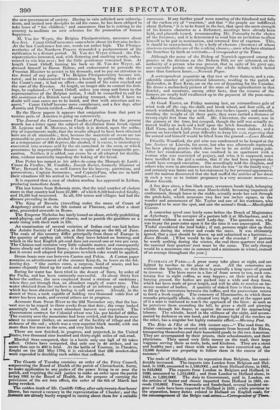The Gazette of Tuesday contains an order of the Privy
Council, empowering the Board of Health of the parish of Christchurch, Surry, to make application to any justice of the peace living in or near the parish, and requiring the saidjustice to make an order upon the parish to pay 1001. to the Board of Health, for the purpose of carrying the rsreionvoskoe. of act into effect, the order of the 6th of March last being The sudden death of Mr. Cunliffe Offley, after only twenty-four hours' Illness, has caused a vacancy in the representation of Chester; and the 'Niemen ate already busily engaged in casting about them for a suitable successor. If any further proof were wanting of the falsehood and folly of the cuckoo cry of "reaction," and that " the people are indifferent about Reform," it is to be found in the fact, that upon the mere strength of his known character as a Reformer, meetings have already been held, and placards issued, recommending Mr. Ponsonby to the choice of the freemen ; and it is determined to send him an invitation to allow himself to be put in nomination, and returned free of expense. This, it should be remembered, is by a body of electors (freemen) of whom nineteen-twentieths are of the working classes,—men who have obtained the franchise by birth or servitude.—Correspondent of the Times.
Although the name of the Bishop of Norwich appeared among the . proxies in the division on the Beform Bill, we are informed, on the authority of a person who was present, that in spite of his great age, . our venerable prelate sat throughout the whole debate, which lasted more than fourteen hours.—Norwich Paper.
A correspondent acquaints iv that two or three farmers, and a con- • siderable number of agricultural labourers, residing in the parish of: Rolvenden, in East Kent, are on the eve of departing for the Canadas. He draws a melancholy picture of the state of the agriculturists in that district; and mentions, among other facts, that the returns of the farmers are nearly half swallowed up in the payment of the poor-rates. —Maidstone Gazette.
At Good Easter, on Friday morning last, an extraordinary gale of wind took off the cap, the shaft, and break wheel, and four sails, of a smock windmill, breaking an iron bolt, two inches square; and notwith- standing the weight of all these parts, they were carried a distance of twenty-eight feet from the mill. Mr. Cheverton, the owner, was in the granary at the time, but escaped, though the mill was actually re- moved bodily an inch and a half upon the brick foundation. At the Hall Farm, and at Little Newarks, the buildings were shaken ; and a person on horseback had great difficulty to keep his scat, expecting that the animal and himself would be lifted from the ground.—Essex Herald.
Priscilla Woodford, the girl who was condemned to be hanged at the late Assizes at Lincoln, for arson, but who was afterwards reprieved, has been playing pranks which show her to be an artful young jade. After her condemnation, she was confined in an apartment with a woman who was convicted of perjury, and who, it is supposed, must have instilled in the girl a notion, that if she had been pregnant she would have escaped execution. She accordingly told the chaplain, and others who were in attendance on her, that she was " in the family way;" and certainly was borne out in her statement by her personal appearance, until the matron discovered that she had stuffed the articles of her dress in such a way as to imitate pregnancy in a very accurate manner.— Boston Gazette.
A few days since, a fine black mare, seventeen hands high, belonging to Mr. Taylor, of Mottram, near Macclesfield, becoming impatient. of confinement, though loose in the stable, actually made her exit through the pitch-hole, which measures two feet ten inches square, to the wonder and amusement of Mr. Taylor and one of his workmen, who happened to be near the spot, and saw the animal's freak.—Macclesfield
Courier,
A somewhat novel case lately came before the Bench of Magistrates at Aylesbury. The occupier of a pasture left it at Michaelmas, and it remained without a tenant until Lady-day. The question was, who was to pay the poor-rates upon it for the time it was unoccupied. Mr. Tindal considered the land liable ; if not, persons might shut up their pastures during the winter and evade the rates. It was ultimately agreed, that a case should be drawn up and submitted to a barrister.— Essex Herald. [What would be the use of the evasion ? If pasture be worth nothing during the Winter, the real three quarters' rent and the nominal four quarters' rent must be the same. The only change would be a maximum rate in summer and a minimum in winter, instead of an average throughout the year.]


























 Previous page
Previous page